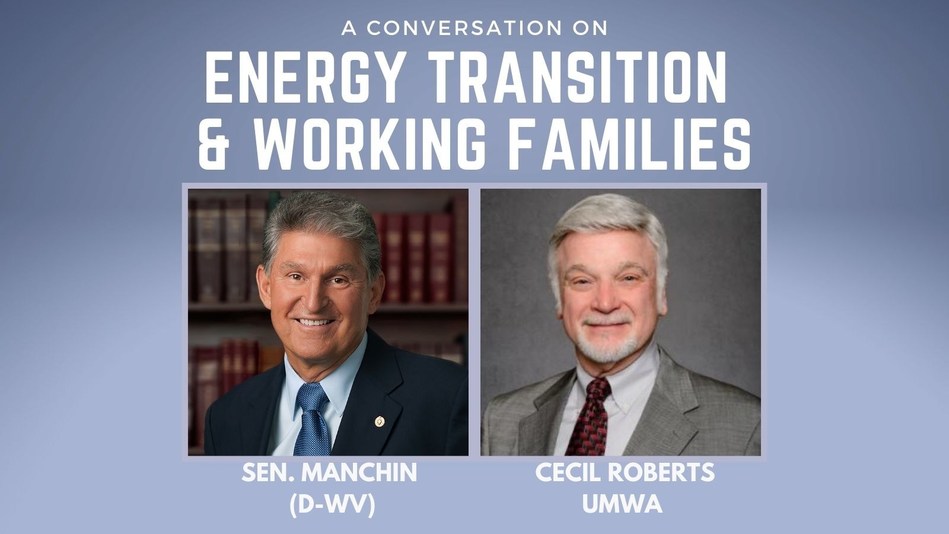Source: MetroNews
April 19, 2021

Senator Joe Manchin and United Mine Workers President Cecil Roberts together endorsed legislation to strengthen labor unions, pushed for federal investments in carbon capture technology, advocated for using coal to make steel in the United States and called for building up coal-producing communities that have languished in recent years.
“We’re very much interested in protecting existing coalfield jobs,” Roberts said. “I would say to our friends in government and high places that we’ve just about had all we can take of layoffs and people losing their jobs in the coalfields. It doesn’t have to be that way.”
Manchin and Roberts, both prominent West Virginians, appeared together at a livestreamed National Press Club event called “Energy Transition and the Next Steps for Coal Country.”
Manchin, a Democrat, is chairman of the U.S. Senate’s Energy and Natural Resources Committee.
He has assumed that prominent role during overlapping debates over how to deal with climate change, how to mitigate economic hard times in communities that traditionally relied upon mining for employment and the appropriate focus of a broad-ranging infrastructure package that could provide a boost.
Manchin generated a headline today through his endorsement of the “Protect the Right to Organize Act” — often called the PRO Act — in the Senate. The bill is a priority for labor organizations, including the AFL-CIO.
The bill would enhance collective bargaining rights, strengthen workers’ right to strike and override state “right-to-work” laws.
“Fifty percent of unions fail in their first year of organizing. This legislation will level the playing field,” Manchin said, announcing he would co-sponsor the bill.
Manchin’s endorsement is significant with a 50-5o split in the U.S. Senate. But his backing is not decisive because the Senate’s filibuster rules would require 60 votes.
“Allowing people who want to join a union to have that opportunity — that’s one of the basic freedoms that we have,” Roberts said, thanking Manchin for his support.
Roberts’ appearance coincided with a release of the United Mine Workers’ set of goals called “Preserving Coal Country.”
“Change is coming, whether we seek it or not. Too many inside and outside the coalfields have looked the other way when it comes to recognizing and addressing specifically what that change must be, but we can look away no longer,” the United Mineworkers stated. “We must act, while acting in a way that has real, positive impact on the people who are most affected by this change.
Roberts noted that coal jobs fell by another 7,000 last year. That leaves about 34,000 active coal miners in the United States, he said.
“We have to think about the people who have already lost their jobs,” Roberts said. “I’m for any jobs that we can create that would be good-paying jobs for our brothers and sisters who have lost them in the UMWA.”
Roberts urged a greater embrace of metallurgical coal, which is used to make steel. The context of that point is the infrastructure proposal being debated at the federal level.
“Start making steel again,” Roberts said. “Let’s have a policy in this country — if we’re going to have infrastructure, let’s make the steel in the United States. Let’s mine metallurgical coal. Let’s have those steel mills in this country. Let’s create thousands of jobs.”
Both Manchin and Roberts urged more use of carbon capture technology to retain coal’s role in energy production. The process captures carbon dioxide emissions from sources like coal-fired power plants and either reuses it or stores it. Much research has gone into the process, but it’s been widely viewed as a high financial hurdle.
“We know we can do it commercially,” Manchin said. “We just haven’t found how we have a downstream or a value for the carbon we’re extracting.”
The UMW’s proposal released today wants the federal government to significantly enhance carbon capture and storage research and development funding with a goal of demonstrating commercial use for coal-fired utilities by 2030. It also calls for building out carbon capture infrastructure such as pipelines and injection wells.
“Someone’s going to develop this technology and it ought to be the United States of America,” Roberts said.
At a separate event, Congressman David McKinley spotlighted the possibilities of carbon capture technology. McKinley, a Republican, spoke on video with a coal miner from the Tunnel Ridge Mine outside Wheeling.
The one-minute conversation was part of the House GOP caucus’s three-day “Energy Innovation Agenda,” a virtual forum that describes conservative solutions for a better climate.
McKinley was pushing legislation to promote development of innovative carbon capture, utilization, and storage projects through the Department of Energy loan guarantee program.
Written by: Brad McElhinny

